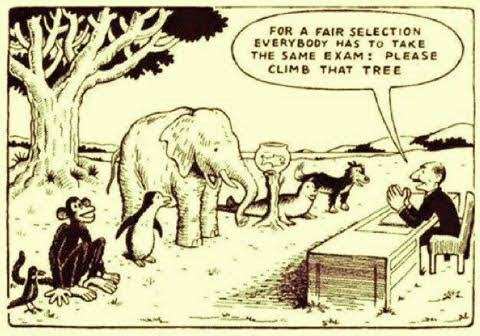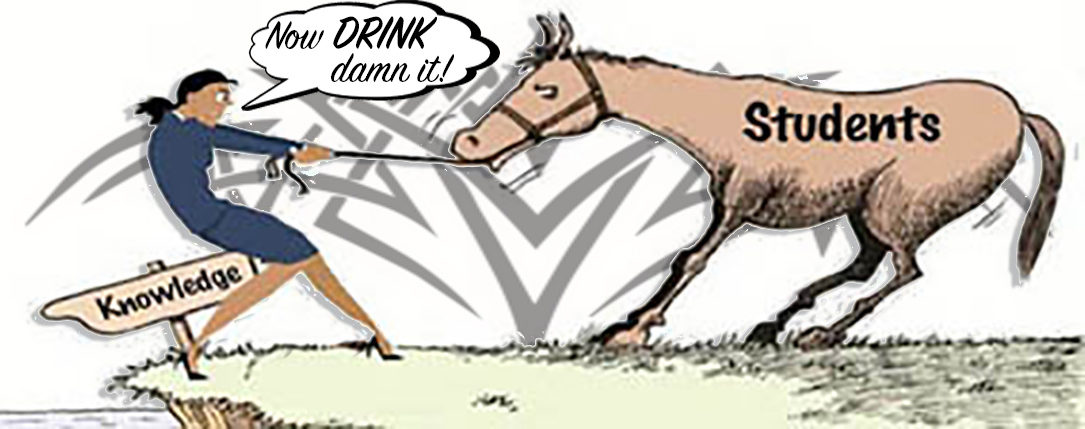Becoming Our Personal Genius
October 5, 2020

“Everyone is a genius. But if you judge a fish by its ability to climb a tree, it will live its whole life believing that it is stupid.”
~ Albert Einstein
I’ve seen this meme, or ones similar to it, many times over the past 11 years (at least), and it is becoming more prevalent in today’s challenging online education environment. To be honest, I’ve never agreed with the allegory although I understand what it’s trying to say. “Everyone is a genius.” Really? Have you met some of my friends? So, I decided to do a little fact-checking to try and determine if I’m interpreting Einstein’s remarks correctly or if I’m in over my head with a man that at least one group calls, “ the greatest scientist of the 20th century and probably of all times.”
Well, imagine that! You can’t believe everything you see on the Internet! Despite being attributed to Einstein for decades, Garson O’Toole, whose life work it is to validate famous quotes, has found that, “No substantive evidence exists suggesting Einstein made this statement.” “In fact,” O’Toole continues, “the quote can be traced to a well-established allegory involving animals doing impossible things, used to illustrate the fallacy of judging someone by a skill or ability that person (or animal) does not possess.”
I feel better having my understanding of the allegory confirmed, but what I still find troubling is the illusion made between using tests of physical capabilities as an educational measure. Of course elephants can’t climb trees and birds can’t swim, so to use a standardized test of either would obviously prejudice the outcome in a specific direction.
I associate “education” with mental capacity and aptitude, not to physical performance. You may be able to learn how to run faster, but everyone has a limit to their ultimate speed. That’s why Olympic sprint records are now measure by the hundreds of a second. The human form can only go so fast, and not everyone can reach those speeds. Same with weightlifting. There are over 7.7 billion people on the planet, but there’s only one man (and no women) who has deadlifted 1113lbs.
And while we’re at it, another popular quote with which I disagree is, “You can be anything you want to be.” I can’t be an Olympic sprinter. No matter how hard I train, or even how much I want to, I’ll never be world-class (or even neighborhood-class) in a foot race.
The people who do reach the panacea of their chosen path have earned the right to be called “genius.” Writing in “Diderot’s Conception of Genius,” Herbert Dieckmann stated, “We mean that not only was his work conceived to be the most perfect specimen of its genre, but that it was regarded as the highest possible achievement of the human mind. Thus, through his work, the genius himself represents the acme of mental and creative endowment.”
By this definition there can only be one “genius.” In every graduating class there is only one valedictorian, and at every Olympics there is only one gold medalist sprinter. The rest of us are just also-rans!
I do believe, however, that everyone has a personal strength; something that, among all their talents, stands out as their “best” skill. It’s typically something they enjoy, and spend time working on improving. For example, as a baseball player I may be a better hitter than I am a pitcher, but that doesn’t mean I’m a better hitter than anyone else. It’s just my best personal skill. I also like to write, and I’d like to think that I’m a better writer than I am an athlete, but that doesn’t mean I’ll out-sell Stephen King or James Patterson on Amazon. It’s just that of all the things I can do, writing may be the best (the jury is still out on that one!). In this respect, I have found my own personal genius.
For education to truly be successful we, as teachers and students, must work continuously to find and develop our own personal genius. We must focus on enhancing our strengths and improving our weaknesses to allow us to exceed our personal goals, regardless of how our accomplishments stack up against our peers. Education stresses individual education, but then grades on standardized test performance. How can we ever be successful if this is how we measure success?
The goal of education – particularly in the elementary and secondary levels – should be to build confidence in our students, to instill in them a passion for improving self-awareness and individual growth. Fundamental skills like reading, writing and calculation should be the foundation upon which students pursue personal interests, and the desire to know more about something that excites them will drive improvement in their academic performance.
But, like someone said, to do this we have to stop trying to teach them to climb a tree while testing how well they swim.



